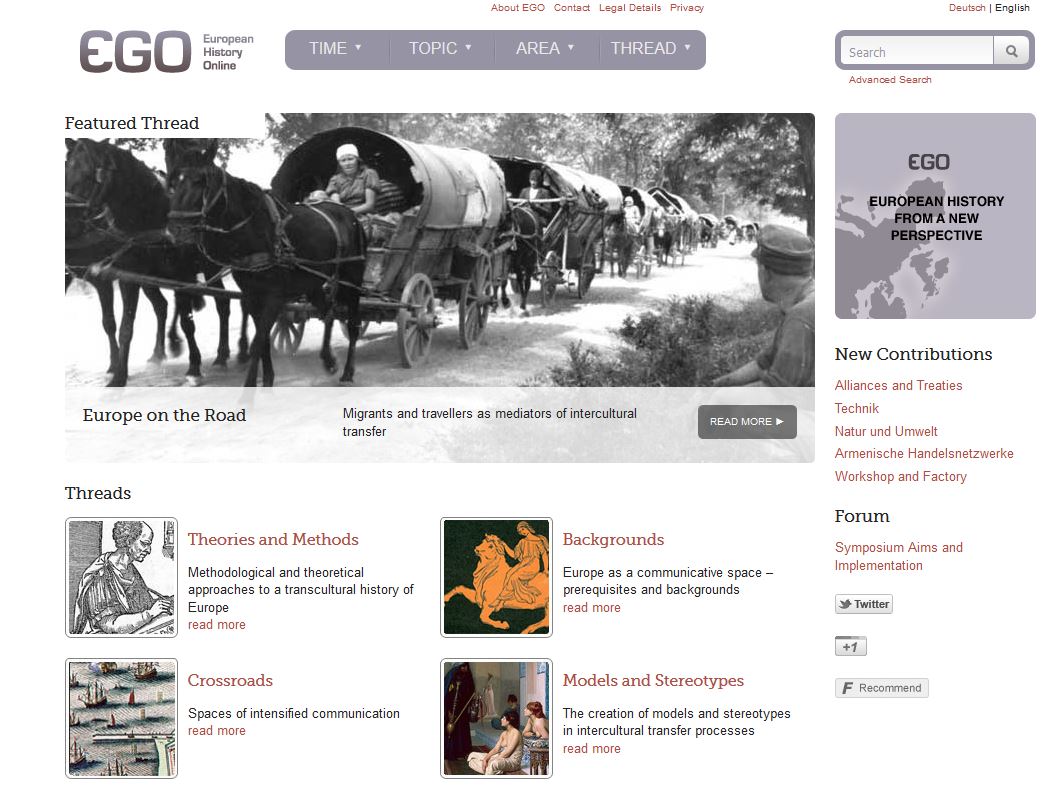Prof. Dr. Johannes Paulmann

Personal Details:
Since 2011 Johannes Paulmann has been Director at the Leibniz Institute of European History (IEG) in Mainz. He is spokesperson for the NFDI4Memory consortium for historically working sciences as part of the development of a National Research Data Infrastructure. As PI he is involved in the Collaborative Research Centre 1482 "Studies in Human Categorisation" at the JGU and the IEG.
Memberships (Selection):
Research Interests:
Editorships (Selection):
Selected Publications:
Research projects:
"Digitale Kartenwerkstatt Altes Reich" (DigiKAR) - Digital Map Lab Holy Roman Empire
The interdisciplinary project »Digital Map Lab Holy Roman Empire (DigiKAR)« developed and explored concepts for the collection, modelling and visualization of place-based historical information from the early modern Holy Roman Empire. It thus contributed both to historical research on the Holy Roman Empire as a space of divided and overlapping rule and to the further development of digital analysis and visualization of historical data with spatio-temporal characteristics.
Claiming Humanitarian Sovereignty in the Arab World: The Egyptian Red Crescent, 1940–1975
From 2015 to 2018, the IEG was involved in the transnational European network "Engaging Europe in the Arab World - European Missionaries and Humanitarianism in the Middle East, 1850-1970", funded by the Dutch Research Foundation NWO and coordinated at Leiden University (Netherlands).
Conception of the data competence centre HERMES - Humanities Education in Research, Data, and Methods
In the conception phase for the establishment of the HERMES data competence centre, the IEG is working with the partners to develop learning opportunities, research activities and networking formats to meet the need for training, further education and training, practice-oriented advice and interdisciplinary networking in the field of humanities and cultural studies research and in related application-oriented fields of activity (especially in GLAM institutions).
EGO | European History Online

Global Humanitarianism Research Academy
The international Global Humanitarianism | Research Academy (GHRA) offers research training to advanced PhD candidates and early postdocs. It combines academic sessions at the Imperial and Global History Centre at the University of Exeter and the Leibniz Institute of European History in Mainz with archival sessions at the Archives of the International Committee of the Red Cross in Geneva.
HERMES: Humanities Education in Research, Data, and Methods
HERMES, short for Humanities Education in Research Data and Methods, is a BMBF-funded joint project focussing on establishing spaces for learning, researching, and networking in the humanities and cultural sciences. The aim of HERMES is to teach, develop and critically reflect on data literacy. In pursuit of this objective, HERMES designs and develops various innovative formats.
Leibniz Research Alliance "Value of the Past"
The Leibniz Research Alliance "The Value of the Past" investigates the significance of the past for societies in the past and present. The first phase runs from 1 September 2021 until 31 August 2025.
LivArch - Documenting Russia’s war against Ukraine: The challenges of living archives for historical knowledge production
Duration: 2024-2027
The war in Ukraine has led to three significant changes in historical research: the emergence of new types of community-driven archives, the generation of archival material in real time, and the increased reliance on digital sources due to the inaccessibility of physical archives. LivArch aims to address these challenges, explore digital preservation practices and establish forms of shared authorship between scholars and activists as archive creators.
NFDI4Memory
Processing the archives of the Städelschule (1920-1950)
The Städelschule (Frankfurt am Main), together with the IEG and the Hochschule Darmstadt, conducted an exploratory survey of the Städelschule's archival holdings in 2021. The Hessian Ministry of Science and the Arts (HMWK) funded this feasibility study, which was also supported by the Frankfurt University Library. In the project, the technological and information science foundations for formal and subject indexing were created and the requirements for digitising the holdings were ascertained.
Research Training Group: "The Christian Churches and the Challenge of 'Europe'"
The research training group examined reactions in the process of European unification, as well as the repercussions and activities that the process gave rise to in the area of the churches. The project also focused on the efforts of the churches to insert religious concepts of values into the political processes.
The History of Humanitarian Assistance in the 19th and 20th Centuries
The aim is to provide an overall account of the history of humanitarian aid. The focus is on historical conjunctures: central moments were colonialism and the civilising mission in the late 19th century, the establishment of international organisations after the First World War, the post-colonial upheaval in the 1970s and finally humanitarian intervention since the 1990s.


